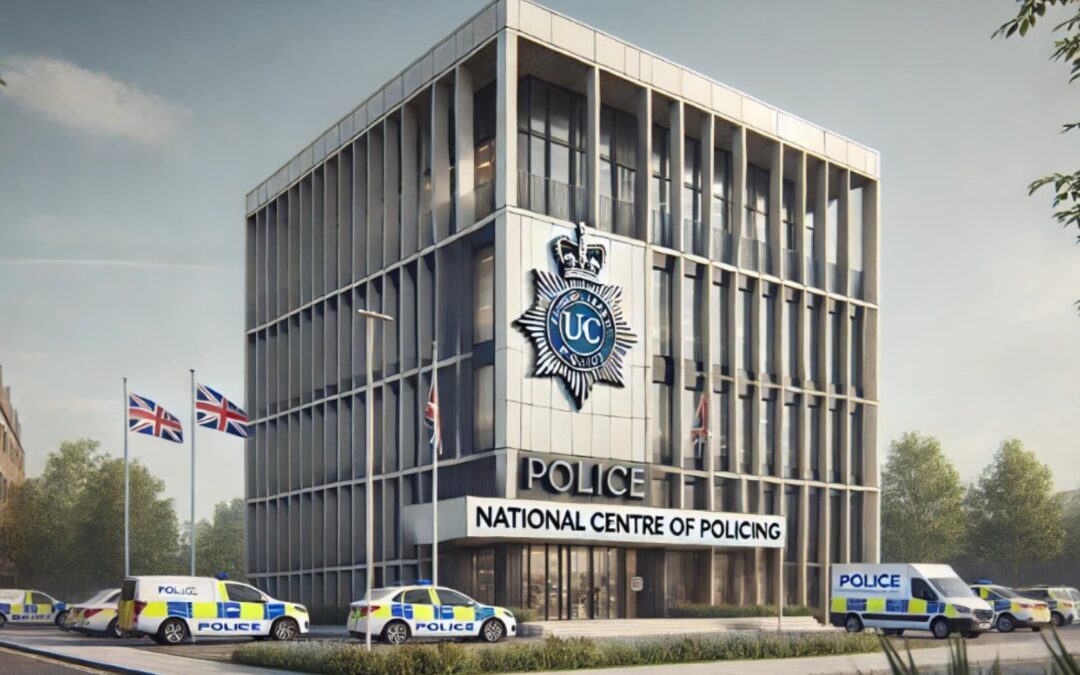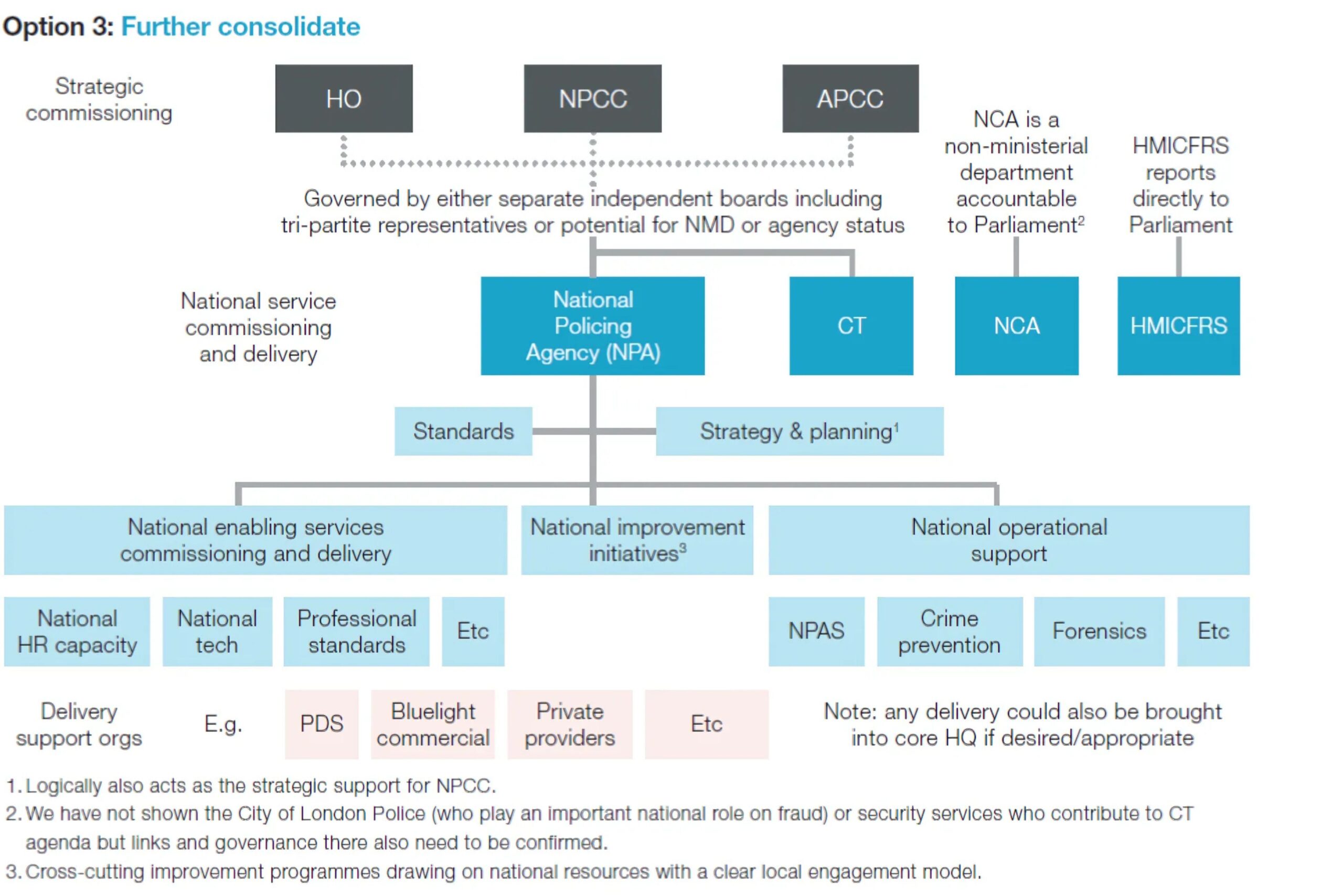Earlier this week, Leapwise and the Police Foundation (1) co-published a brand-new policy paper: ‘Fit for the Future: the case for a reformed national policing landscape.’ If you didn’t catch it, you can find the full version here. We also published a launch op-ed (2) in Policing Insight – co-written by Leapwise MD Tom Gash and Police Foundation Director Dr Rick Muir – for a quicker summary of the paper.
We also wanted to give you, as readers of our Leapwise blog, an extra insight into the thinking behind the paper. So, in our first-ever Managing Director’s blog, here’s Tom to tell you why reforming the national policing landscape is so important to fixing policing across England and Wales.
Where we are today
Throughout my career – both at Leapwise and before – I’ve had the opportunity to work all over the world and see all kinds of different justice systems and policing models. Unsurprisingly, nowhere’s perfect! The USA has an endlessly complex system of overlapping law enforcement bodies – 18,000, by one count. Some European systems have extremely localised policing bodies that lack the specialist resources to tackle serious crime effectively. And the UK, specifically England and Wales, is no exception; our model’s far from perfect either.
There are plenty of great things about the British policing system. Our local neighbourhood policing structures are mostly well-designed. We have relatively effective links with international counterparts (even after the fears some had about Brexit’s effect on cooperation with our neighbours). The overwhelming majority of those serving are committed and diligent, and policing’s leaders are remarkably innovative by international standards. We’re also one of very few countries to have mostly unarmed police on our streets.
But we also have our own problems. In particular, the national policing landscape in England and Wales just isn’t fit for purpose anymore. As we set out in ‘Fit for the Future’, there’s far too much prioritisation of sectional local interests over shared national ones. That’s an inevitable consequence of having 86 ‘corporations sole’ – 43 Police and Crime Commissioners (PCCs) and 43 chief constables – who hold veto power over any proposed national solution. There are too many disincentives to collaborate, leading to many different local approaches where just one would be far better, and certainly cost the taxpayer less. Change therefore too often happens at the pace of the slowest mover, which undermines adoption of new technologies, savings from joint procurement, fit-for-purpose forensic services and so forth.
These aren’t new observations, of course. Almost anyone working in or around the system today will be familiar with these complaints. With the added challenges of a political debate that seems to exclusively talk about frontline inputs (ignoring all the strategic enablers that make the frontline perform well) and a Home Office which has, in recent history, offered little system leadership, it becomes clear that we need a reset.
Why we must prioritise fixing the national landscape
In some ways, making this case doesn’t come naturally to me. I’m generally sceptical of the idea that structural reorganisations are the best path to better outcomes.
Personally, my bias is towards fixing processes, systems, culture, and leadership in existing institutions first – avoiding the disruption of structural change that can leave people worried about jobs (usually unnecessarily) and sometimes significant implementation costs. There’s also always a risk that new institutions might solve ‘problem X’, but throw up ‘Y’ instead. Then, with your reform capital already spent, your ability to fix those new challenges can be more limited. I can also see why many in policing – understandably frustrated by the ongoing financial pressures – will simply feel that any effort and funding should be funnelled straight to the frontline first.
And yet, I’m absolutely convinced that fixing the national landscape should be the first priority for police reform in this parliament. It’s the best way to make policing more effective and it would address some of the deep problems we see in the system today, such as:
- Excessive duplication and waste – the standard criticism of 43 forces duplicating the same work 43 times. In areas like fleet or technology, there’s little need for every single force to test and implement individual systems so often. A shared national approach (one standard assessment of vehicle options or one national software solution – or even a choice of 3 approved systems) would reduce waste.
- Poor alignment with citizens’ expectations – citizens increasingly expect a reasonably standardised offer from their public services. In our current policing model, there’s far too much variation – for example, in some forces, forensics officers are far more readily available than others and victims of crime get different forensics tests performed to support an effective prosecution – and too little in the way of common standards or practices.
- Ineffective national leadership models – NPCC leads (typically chief constables or deputy chief constables tackling issues like managing police finance, improving co-ordination between police and the criminal justice system or improving technology) are highly committed, but they’re usually balancing enormous local operational duties with their (part-time) national portfolio leadership work. This means their national voice can only ever be limited, even in areas like fraud or cyber which entirely transcend the boundaries of local structures.
- Profound frontline constraints – perhaps most importantly, the weakness of national enabling or operational support functions doesn’t just lead to waste. It actively constrains frontline cops doing their jobs. Neighbourhood policing is inevitably harmed by the weak centre of policing and victims and communities end up losing out.
A new reform agenda
If that all seems a bit doom and gloom, I should note here that I’m profoundly optimistic about policing.
Perhaps more than I’ve ever seen before, system leaders appear united on the need for reform and are even relatively aligned on exactly what it should look like. The Government, especially given its extremely ambitious ten-year Safer Streets mission, also appears ready to seize the moment. So while structural reform of policing has been dormant for nearly a decade, with a forthcoming policing White Paper in the works, it seems that a new reform agenda is taking shape.
But what exactly are we proposing in ‘Fit for the Future’? Well, I’ll keep it brief – and urge you to read our paper for the finer details – but here’s what we think needs to happen.
First, policing needs a much more robust process for making national decisions. We can’t continue with a desperately clunky system of 86 vetoes, it just isn’t agile enough. The solution could be a more activist Home Secretary, either directing collaboration or funding national solutions directly (and cutting the local policing grant to pay for it). But a far better approach might be some kind of majority or qualified majority voting system within the NPCC and APCC, where big decisions are debated and everyone has a say – but no one can veto progress. That would facilitate easier agreement on national solutions and protect the tripartite model of governance which sees the Home Office, chiefs, and PCCs all working together.
Secondly, the Home Office needs to become a stronger system steward – with much clearer direction-setting and system design. That would involve establishing a small number of long-term strategic priorities for policing, that could offer certainty and stability for local forces. To support that, the Home Office should introduce a more formalised budgeting and objective-setting process, with multi-year budgets (where possible), an evidence-based set of performance expectations, and a clarified role for the National Policing Board.
Finally, we need to establish a new National Police Agency with four main functions. It would oversee all key national operational support functions (like mutual aid or national forensics capabilities) and national enabling services, including taking decisions about whether to ‘build in-house’ or ‘buy-in’ services. It would host several full-time senior leaders who could speak nationally on core policing issues – like serious violence or fraud – offering professionalised operational leadership. And finally, it would need an extremely robust costing and benefits assessment capability, with sight of costs, demand, and capability gaps nationwide.
There are various ways this National Police Agency could be constructed – we set out four options in ‘Fit for the Future.’ The Agency could sit alongside a streamlined College of Policing (Option 1), co-exist with a strengthened Royal College of Policing (Option 2), or even be merged with it (Option 3.) In a more maximalist approach, the Agency could even host the NCA and Counter-Terrorism Policing – though we’re much more cautious about this. For now, Option 3 is our preferred model to deliver results fast at minimal disruption to the system.
Getting reform right
I completely recognise the dangers some will point to of ending up with an out-of-touch, unresponsive, even dictatorial centre – these are risks I worry about too. As I said earlier, I’m generally not the biggest supporter of central reorganisations.
But I’m hopeful that our proposed model avoids that risk. We’re very clear that tripartite governance is important. We want to see the Home Office, PCCs and Chief Constables working effectively together to appropriately balance local needs with national priorities.
For me, it’s just about getting that balance right. At present, the centre’s so underpowered that the national enablers of success aren’t anywhere near to being in the right place. That, in turn, is undermining local policing’s effectiveness, wasting money and making policing too slow to prepare for the future of crime.
There are also important implementation questions to consider – something we’ll come back to in a future Leapwise blog. But when I look at the VICTORY framework for successful organisational change we use at Leapwise – more detail here – I feel that the police reform agenda is shaping up well. We’re still in the early stages and it could still prove to be a very bumpy road ahead. But there seems to be reasonable clarity on the vision for change and an impressive coalition building too. I’m optimistic that we can get this wave of reform right.
Seizing the moment
Many will remain sceptical of these ideas. That’s fair. I completely accept that fair-minded people will have some reasonable objections to our proposals. I’d simply stress again that the primary benefit of a stronger centre is, counterintuitively, to strengthen local policing.
Talk to any frontline officer today about what frustrates them and – leaving aside pay and shift patterns – they’ll probably complain about HR systems, outdated technology, paperwork, constantly changing standards, poor records management, vehicles, data issues, and the difficulty of accessing crucial information held by other forces. They’ll argue, rightly, that it gets in the way of doing their job: protecting the public. But all of these issues are exacerbated by problems way upstream, by a national policing landscape that often does more to constrain local policing than it does to enable it.
And so, with a new government apparently committed to making change early on in this parliament, there’s an exciting opportunity to make a difference. I’d urge anyone – whether they agree or not with the ideas we put forward in ‘Fit for the future’ – to lend their voice to the debate. On Tuesday 19th November, the Home Secretary announced a new National Centre of Policing very much in line with our proposed approach, so big change is definitely on the cards, and now is the time for everyone to engage in the important detailed choices ahead.
Your feedback, ideas, criticisms and suggestions are all welcomed. Please don’t hesitate to reach out to Leapwise or the Police Foundation to share your views with us.



